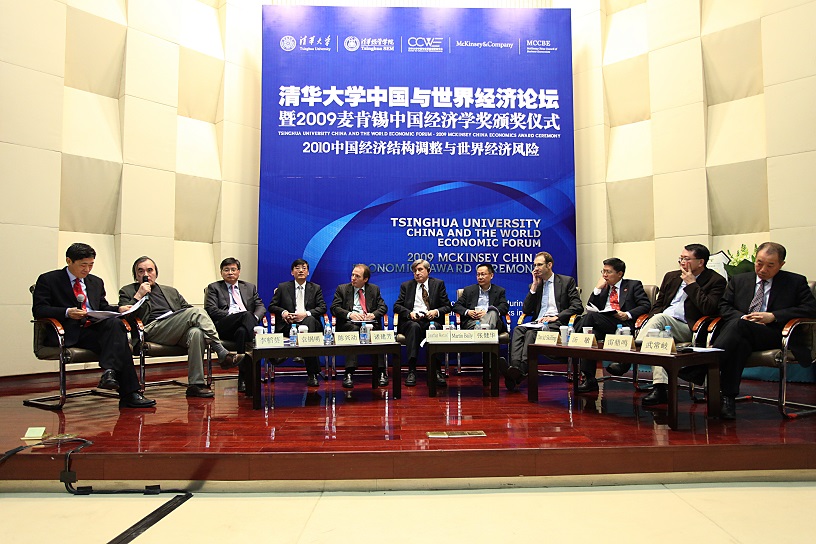
On Jan.16th, 2010, Tsinghua University China and World Economic Forum(Ⅱ), co-hosted by Tsinghua University Center for China in the World Economy( CCWE ), SEM Alumnus Affairs Office and Mckinsey&Company, was successfully held in SEM Grand Lecture Hall. For the topic of this forum is “China Economic Restructuring and Global Economic Risks in 2010.” About 450 audience attended the event. They represent Tsinghua faculty and students, government officials, and business executives. David Daokui Li, Director of CCWE, moderated the forum.
Wang Yiming, Executive Associate Director of the Macro-economic Research Institute of China National Development and Reform Commission (NDRC), gave a keynote speech on Rational Route and Choice for Chinese Economic Restructure in the Post-crisis Era. He pointed out that the sustained economic growth forChina’s past 30 years and global economic crisis have greatly changed the world andChina’s domestic conditions.Chinais coming into a new stage. The challenge we face is how to increase the domestic consumption that contributes to the economic growth, and how to utilize scientific and technology innovation and human resourses. Martin Baily, Senior Fellow of Economics Studies atthe Brookings Institution, compared American economic situation during the crisis from what it is now. He expressed his confidence about American economy’s future due to the country’s natural resilience to recover and he also spoke highly of the Chinese economy’s development especially the prompt measures that the Chinese government had taken to deal with the financial crisis. Jia Kang, Director of the Finance Research Institute of the Ministry of Finance, called for the adjustment of the economic structure, deepening of further reform and encouragement of innovation in his speech.
During the panel discussion, specially invited guests expressed different views on the economies ofChinaand the world. According to their analysis, not only shouldChinaenhance economic freedom and flexibility, but also raise people’s income level to promote domestic demand. The government should take more responsibility to oversee the quality of goods in the market. Private enterprises should adapt to the situation in which government investment and private investment go hand in hand in the marketplace in the process of economic restructuring.China’s central bank’s monetary policy was debated in the discussion. The panelists believe that Chinese economy is growing fast, but environment and educational policy as well as the income gap between urban and rural areas remain to be critical issues to address . Besides, the government faces quite a lot of problems, including the pressure of currency appreciation, , shortage of consumption, risks of inflation, . No matter what strategy the government takes, Chinese economy should grow in a dynamic context of changing world economies.
McKinsey Global Institute presented its annual China Economics Award for 2009 at the forum. Jonathan Woetzel, Director of McKinsey&Company, made remarks about the award. Award winner was Lu Jiangyong, Associate Professor of the Peking University Guanghua School of Management, who thanked McKinsey and donated part of his prize to Guanghua. David Li concluded the session by expressing his appreciation to the panelists and audience. He wished the people present a happy Chinese new year.





